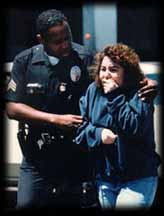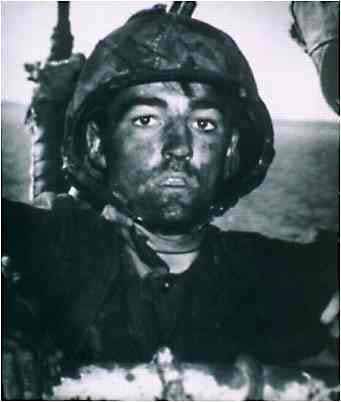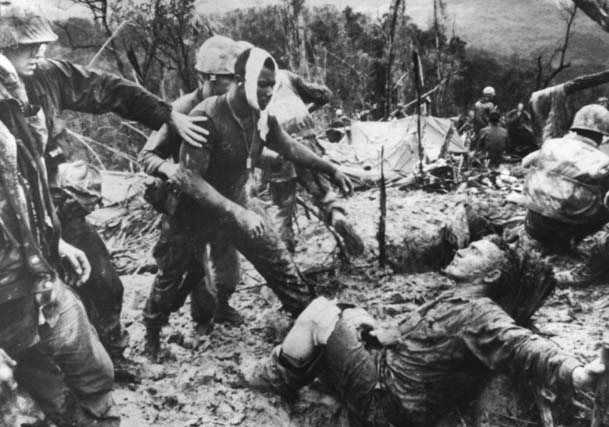"MEN IN BLUE"
by Edward Conlon

"...those who traffic in violence, regardless of the justice of their cause, risk their hearts and minds as much as their lives. And those who retain their integrity throughout the ordeal deserve our respect, for it is on our behalf that they fight."

A battle fatigued United States Marine in WWII with the "thousand yard stare."
The wrath of Achilles transformed him from the noblest of warriors into the most terrible, who continued to attack adversaries he had already killed. After his betrayal of his commander, and the death of his friend Patroclus, he was no longer truly himself; his humanity was a casualty of war. The psychiatrist Jonathan Shay, in his 1994 book, "Achilles in Vietnam," likens the Greek hero of the Trojan War to American soldiers in Vietnam whose combat experiences resulted in what he calls the "undoing of character." In them, feelings of betrayal and loss led to such atrocities as the massacre at My Lai and contributed to the high incidence of addiction, criminal behavior, and suicide among returning veterans.
The explosions of rage at Troy and My Lai are not far removed, at least in spirit, from what may have prompted the behavior of the Brooklyn police officers accused of seriously inuring a Haitian man, Abner Louima, in the precinct house by forcing a toilet plunger up his rectum and then into his mouth. In police work, even more than in modern warfare, there exists the imminent danger of hand-to-hand combat. This combat, whether it arises from a routine traffic violation, a domestic dispute, or a bank robbery, can be intimate and fatal. The violent death of a police officer is a frequent occurrence, and it leaves an acute but transient mark on the public consciousness. Other casualties, ranging from line-of-duty injuries to suicide, whose rate among policemen is significantly higher than the national average, go largely unremarked by society as a whole. Unlike most sentient beings, a police officer who hears gunfire is obliged to run toward it, and this profoundly unnatural act requires a backup that includes a significant measure of public trust.
Such trust, of course, in no way precludes civilian scrutiny of police behavior. Still, New York has made attempts to regulate police behavior that violate not only due process but common sense. Here someone who makes a demonstrably false statement about a police officer to the Civilian Complaint Review Board goes unpunished. The complaint, however, remains on the accused officer's record. Before Mayor Giuliani's administration, cops on patrol were strongly discouraged from making drug arrests, even though narcotics - especially crack - had become the primary cause of an epidemic of violent crime. Between 1990 and 1993, there were more than eight thousand homicides in New York. Some public figures nevertheless maintain, with a stubbornness bordering on the surreal, that the police have had next to nothing to do with the recent, epochal drop in crime in the city.
Fortunately, most New Yorkers have believed otherwise, and until mid-August the N.Y.P.D. was enjoying considerable public esteem. The sickening Louima incident - a story that seemed more like a dispatch from Bosnia or Iraq - quickly changed that. Yet it is worth remembering that only a week earlier some of the officers who were implicated in the incident had risked their lives to rescue people from a collapsing building: they had reŽntered the scene of the disaster even after being ordered, for their own safety, to withdraw. Such a radical mutation of heroism into the basest brutality is not often encountered in our daily lives, but it is a hallmark of soldiers' lives in war. Moreover, what induced it can be mysterious even to the officers involved. Belief in one's own exceptionalism may be a cultural clichť, but it is also in the manual for tragedy.
Two officers are accused of the torture of Louima; two more are accused of beating him up. The thirty-eight thousand other officers of the N.Y.P.D. have been stigmatized by the incident, and accusations of collective guilt have only intensified the anger and shame felt by honest and honorable cops. Indeed, those officers who have been obliged to continue their police work amid continuing threats and rallies (with waving plungers) call to mind the returning Vietnam Vets who were welcomed home with cries of "Baby killer!"
No talk of "battle fatigue" can excuse police brutality - or military atrocity. Neither the laws of the state nor the rules of war permit it. But the labor of understanding what might have happened to two cops to make them lose all sense of decency - indeed, all sense of themselves - and betray their oaths of office, the public trust, and their thousands of colleagues must be undertaken. And our judgement must be as precise as it is exacting.
Simone Weil, in a 1940 essay on "The Iliad," argues that the greatness of Homer's epic lies in its equal treatment of enemies - treatment that makes it easy for one to forget that its author was Greek rather than Trojan. The work's encompassing humanity, Weil writes, allows the horror of violence to be rendered with such lucid, sorrowing eloquence - with a "note of incurable bitterness... that proceeds from tenderness and that spreads over the whole human race, impartial as sunlight." She goes on to say, "Force is as pitiless to the man who possess it, or thinks he does, as it is to its victims; the second it crushes, the first it intoxicates. The truth is, nobody really possess it... Thus it happens that those who have on loan from fate count on it too much and are destroyed."
Weil's warning is clear: Whether engaged in combat on the Trojan plain or in the jungles of Vietnam or on the streets of Brooklyn, those who traffic in violence, regardless of the justice of their cause, risk their hearts and minds as much as their lives. And those who retain their integrity throughout the ordeal deserve our respect, for it is on our behalf that they fight.
September 1997


 Back
to Suicide
of Baxter Slate Page
Back
to Suicide
of Baxter Slate Page